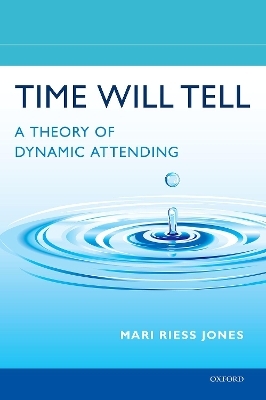
Time Will Tell
Oxford University Press Inc (Verlag)
978-0-19-061821-6 (ISBN)
Importantly, this interaction involves synchronicity between an attender and external events. This emphasis on time and synchronicity distinguishes the author's theory, called Dynamic Attending Theory (DAT), from other approaches to attending which characterize attention metaphorically as a filter, resource pool, spotlight, and so on. Recent research from neuroscience has lent support to Riess Jones' theory, and the goal of this book is to bring this new research as well as her own to the wide audience of psychologists interested in attention more broadly.
Professor Jones received a B.A. from the University of California, Riverside, and her PhD from the University of Massachusetts before moving to Ohio where she was hired as a visiting Assistant Professor in the Psychology Department of the Ohio State University. In 1971 she gained a permanent position in this department, and spent the rest of her career at this university. After 38 years, she retired in 2006 to write this book.
Table of Contents
Chapter 1: Overview
Part I: Theoretical Framework
Chapter 2: Time... and how we study it
Chapter 3: The Tunable Brain
Chapter 4: Tuning into world events: A General Attending Hypothesis
Chapter 5: The temporal niche: An Aging Hypothesis
Chapter 6: Tuning into very fast events: Pitch perception
Chapter 7: Tuning into Slow events
Chapter 8: Parallelism: Expectancy and production profiles
Part II Applications of Theoretic constructs: To domains of music and speech
Chapter 9: Meter and rhythm: How we hear them
Chapter 10: Learning time patterns
Chapter 11: Musical Melodies
Chapter 12: Speech Timing
Chapter 13: Melodies of Speech
Chapter 14: Learning speech: From phonemes to syllables to words
Chapter 15: Concluding Speculations
| Erscheinungsdatum | 18.12.2018 |
|---|---|
| Verlagsort | New York |
| Sprache | englisch |
| Maße | 257 x 178 mm |
| Gewicht | 953 g |
| Themenwelt | Geisteswissenschaften ► Psychologie ► Allgemeine Psychologie |
| Geisteswissenschaften ► Psychologie ► Verhaltenstherapie | |
| Medizin / Pharmazie ► Studium | |
| ISBN-10 | 0-19-061821-3 / 0190618213 |
| ISBN-13 | 978-0-19-061821-6 / 9780190618216 |
| Zustand | Neuware |
| Informationen gemäß Produktsicherheitsverordnung (GPSR) | |
| Haben Sie eine Frage zum Produkt? |
aus dem Bereich


